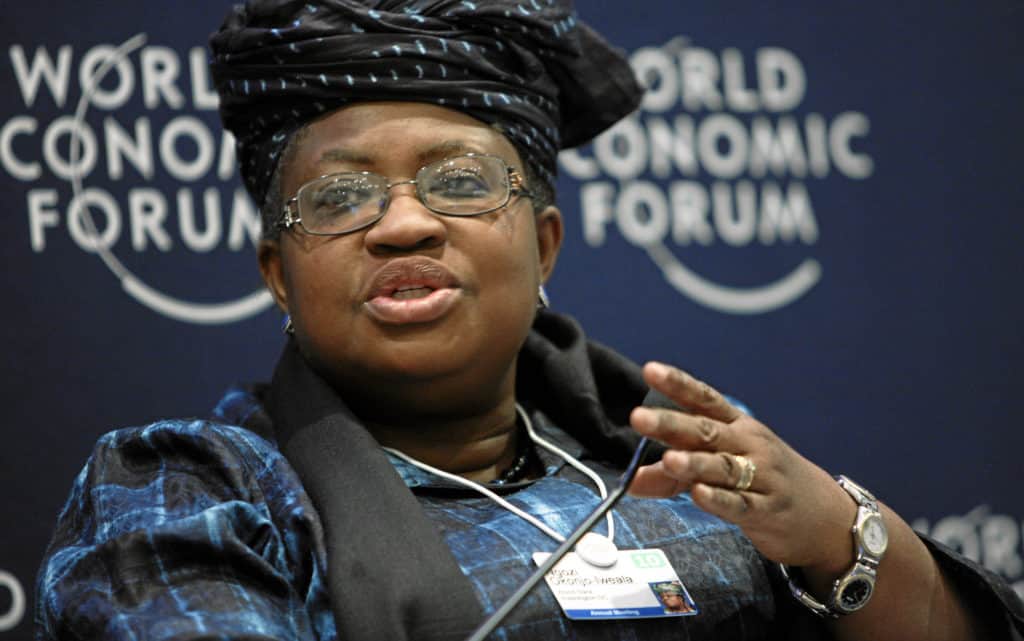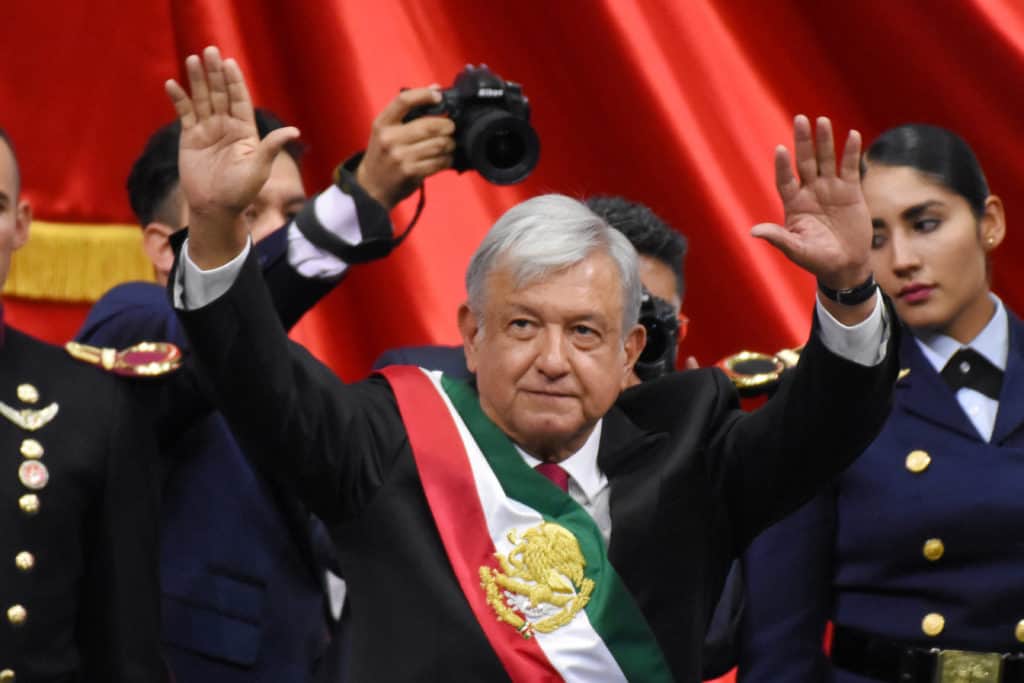* Biden admin endorses WTO majority choice for Director-General.
* Aluminum tariffs reinstated on UAE.
* Court of International Trade upholds Section 232 steel tariffs.
* Semiconductors in spotlight.
* Beijing attempts to dominate world technology standards.
* AMLO turns statist,
* Biden abuses Canada.
* EU proposes tariff settlement with US, joint trade policy commission.
with Founders Broadsheet trade columnist L.C.

US ends block on Okonjo-Iweala at WTO
The WTO will have a new leader. The US Trade Representative office announced in a tweet and in a press release on February 5th that it supports the selection of Nigeria’s Ngozi Okonjo-Iweala to be WTO Director-General, cementing her appointment. The move came after South Korean Trade Minister Yoo Myung-hee withdrew her candidacy for the post. She would not have done so had the Biden administration continued to support her, as the Trump administration had done. Okonjo-Iweala is therefore set to be officially appointed by the WTO General Council. This is seen as a positive signal for US relations with the WTO. There is hope that Okonjo-Iweala will be able to prod members to cooperate in settling the Appellate Body crisis.
Okonjo-Iweala, 66, is an economist and international development expert (BA, Harvard; PhD, MIT) who has served as Nigeria’s minister of finance and foreign affairs and has been a managing director at the World Bank, where she worked for 25 years. She holds Nigerian and US citizenship. While Okonjo-Iweala’s American background (education, residency, citizenship) didn’t win over the Trump Administration, it also didn’t provoke a veto of her candidacy from China. That’s probably because Beijing didn’t want to deal with the anger a veto would provoke in Africa.
Biden slaps tariffs back on UAE
It had been expected that President Biden would quickly remove the Section 232 metals tariffs, at least on allies Japan and the EU, perhaps also India and Turkey. The tariffs are already largely ended or switched by agreement to quotas for South Korea, Australia, Brazil, and Argentina as well as Mexico and Canada. But one of the new president’s earliest moves caused some to think he may find the tariffs more attractive than had been expected.
On February 1st, he reinstated the 10% Section 232 aluminum tariffs on the UAE that President Trump had removed the day before he left office. The former President had arranged to have them replaced by a quota, so the action wouldn’t have much real-world impact on trade, but it was understood to be a gesture of appreciation to the UAE for recognizing Israel. Biden, however, announced the initiation of a review of Trump’s arms sales to the UAE. Biden, however, seems eager to repudiate anything Trump did, even Trump’s major positive achievements, such as his Mideast policy that brought Arab countries together with Israel. This has not, however, deterred Biden from embracing some of Trump’s counterproductive policies, such as his trade protectionism.
The United Steel Workers union welcomed the Biden aluminum tariff move, saying that the “UAE’s state-supported aluminum producers would have had the right to flood the US market, resulting in new trade attacks on our industry.” Some domestic steel-makers also applauded the tariff re-imposition. The UAE isn’t a minor player in the US aluminum market. Being energy-rich, it is a cheap aluminum producer. The UAE provides over 10% of US imports of the metal, which is its largest export by value to the US.
Section 232 upheld by court
Meanwhile, the US Court of International Trade released a ruling on February 4th upholding the Section 232 steel tariffs of 25% that had been challenged in a case filed by a group of steel importers. This was the second week in a row when the CIT issued a ruling supporting the Trump administration’s tariffs.
The court’s three-judge panel ruled that Section 232 of the 1962 Trade Expansion Act “grants the president latitude in evaluating whether imports threaten the national security.” Judge Garry Katzmann added that while “There have been proposals put forward suggesting greater Congressional oversight, including hearings, or statutory amendments which would expand Congress’s role in the implementation and review of tariffs… these are policy matters that fall within the province of the legislative branch; it is not the role of the court to opine about them.”
There has been a recent rally in some steel prices, yet capacity utilization remains below the 80% level targeted in the Commerce Department’s Section 232 recommendations. Although the tariffs harm industrial users of steel inputs and consumer purchasers of finished goods using steel, President Biden may not want to go against manufacturing companies and the United Steel Workers union, given his Buy American rhetoric, echoing Trump before him.
Semiconductors in spotlight
Aluminum and steel aside, semiconductor production has moved to the center of attention for two reasons. First, a global shortage in semiconductors is threatening the auto industry and others. Second, semiconductors have long been at the heart of US-China tech competition. It is the key product increasingly subjected to US export controls. The US is clearly in the lead, developing advanced chips and chip-making equipment that Chinese companies are far from being able to replicate. But the Chinese are intensively mobilizing to catch up and are threatening to invade Taiwan, where most of the world’s semiconductor chips are manufactured.
China’s attempt to dominate technology standards
But it’s not just semiconductors. China’s is seeking to dominate new technologies worldwide by controlling the committees that set world standards. This is highlighted in a February 8th Wall Street Journal article titled, “From Lightbulbs to 5G, China Battles West for Control of Vital Technology Standards.” The article explains:
Standards based on patented technologies often require users to pay licensing fees. Nokia Corp. and Qualcomm Inc., for instance, earn billions of dollars annually from patents that underpin cellphone systems made by rivals. China would rather earn that kind of money by designing standards to match technologies developed by its own companies.
…
“China is promoting standards that would boost exports for companies with links to Beijing as well as support its state-security apparatus,” Japan’s former trade minister Akira Amari warns. “If Chinese products are set up to collect data,” he said, “you have to work on the assumption that it will all end up with the Chinese government.”

Troubles with AMLO in Mexico
An effort by Mexican President Andres Manuel Lopez Obrador (“AMLO”) to reform Mexico’s energy sector, favoring the state-owned utility over investors and private companies, is meeting strong resistance both in Mexico and the US. His effort will almost certainly by challenged by Washington as violating the USMCA, though AMLO reportedly insists the energy sector was not covered by the agreement. This is a position almost no one agrees with.
On January 29th, AMLO sent the Mexican Congress a draft decree reforming the Electricity Industry Law, including regulatory changes that will disadvantage the private sector for the benefit of the Federal Electricity Commission (FEC). The bill would benefit the state-owned companies at the expense of private companies in the petroleum area and undercut renewable energy companies. The business association CCE calls the bill “indirect expropriation.”
On February 5th, a top US Chamber of Commerce official warned directly that the bill would violate the USMCA: “Unfortunately, this move is the latest in a pattern of troubling decisions taken by the government of Mexico that have undermined the confidence of foreign investors in the country at the precise moment enhanced foreign direct investment in Mexico is needed more than ever…. Such drastic changes would open the door for the reinstatement of a monopoly in the electricity sector and, we believe, would directly contravene Mexico’s commitments under the USMCA.”
Canada as Biden punching bag
Tensions are also rising in trade relations with Canada, but in this case the US is the offending party. The Canadians were hard hit by President Biden’s cancellation of the Keystone XL pipeline, on which many Canadian workers were employed. Canadians also fear they will lose the most of any US trading partner under Biden’s tightening of Buy American rules.
As an op-ed writer from the Montreal Economic Institute explained in the February 2nd Wall Street Journal, Biden’s plan “is worse than Trump’s for suppliers…. Components are key to Canada’s exports to the US…. Considering that Canada’s two largest exports are natural resources and automotive components…. [T]he new president seems to be going for his neighbor’s jugular…. Mr. Biden promised a new era of cooperation and openness with other countries. Instead, he has used Canada as a punching bag.”
EU proposals
The Europeans are again trying to enlist the Biden administration in cooperative efforts. EU Trade Commissioner Valdis Dombrovskis, at a February 1st event, urged the US to drop the Section 232 metals tariffs on the EU in exchange for a lifting of the EU’s retaliatory tariffs. He also urged the new US administration to reach an aircraft subsidies deal so that the tariffs both sides imposed in that dispute can be terminated. “It’s very important that we put those bilateral trade irritants behind us and really concentrate on the broader international trade agenda,” he pleaded. Another proposal Brussels has been pushing with Washington is for the creation of a US-EU Trade & Technology Council to provide a forum for bilateral consultations on issues relating to technology development. This week, the US Chamber of Commerce endorsed the idea and urged the new White House to accept it. Such a council could be useful for establishing Western technology standards to counter China’s attempt to dominate standards — so its hardware can funnel data to Chinese state intelligence agencies and the military, as Huawei intends to do.

Leave a Reply